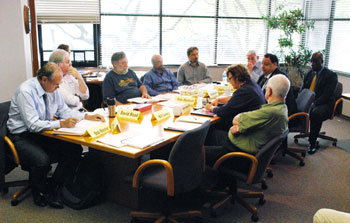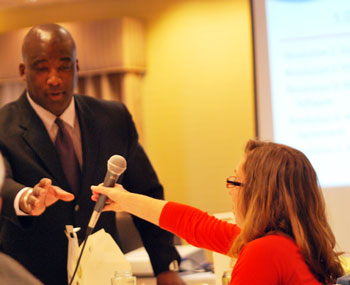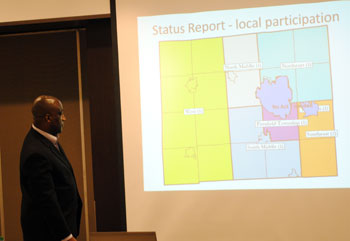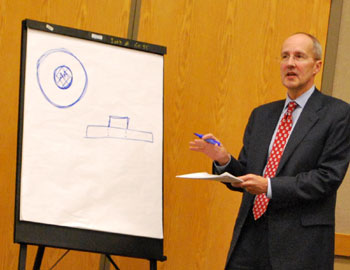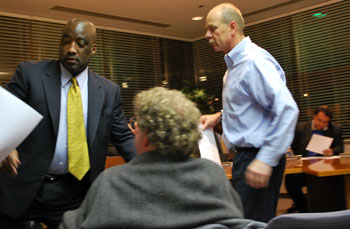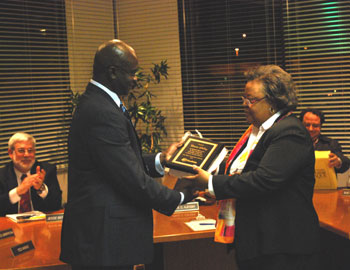Washtenaw County board of commissioners special working session (June 14, 2012): A wide-ranging discussion on proposed expansion of public transit in Washtenaw County revealed some sharp philosophical differences among county commissioners.
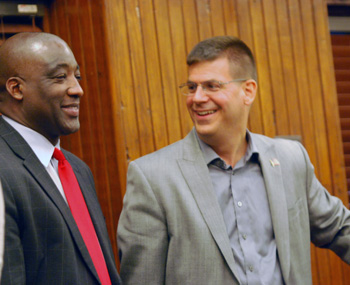
From left: Michael Ford, CEO of the Ann Arbor Transportation Authority, talks with county commissioner Dan Smith after the June 14, 2012 special working session of the county board, which focused on a plan for regional public transit. Smith put forward several amendments to a four-party transit agreement and articles of incorporation that were discussed at the session. (Photos by the writer.)
A three-hour working session was intended to be a chance talk through these issues prior to a formal board of commissioners vote on a four-party transit agreement and articles of incorporation for a new Act 196 transit authority. That vote might take place as soon as the county board’s July 11 meeting. These documents would set the framework for a broader public transit authority than currently exists in the county.
Washtenaw County is one of the parties to the four-party agreement, but with a unique role compared to the other three entities: the cities of Ann Arbor and Ypsilanti, and the Ann Arbor Transportation Authority, which is spearheading this effort. Unlike those entities – whose governing bodies have already approved the transit documents – the county would not be contributing assets (AATA) or a millage (Ann Arbor and Ypsilanti). Nor would the county board be asked to put a countywide millage request on the ballot.
Rather, the county clerk would be asked to file articles of incorporation with the state – an action to create a transit authority under Michigan Act 196. When formed, the Act 196 board would have authority to put a funding proposal on the ballot for voters to consider. A financial advisory group that’s been working on this effort has suggested that revenues equivalent to a 0.5 mill tax would be needed to cover the cost of expanded services for the first five years. [.pdf of financial advisory group report]
Most of the comments and questions from commissioners at the working session related to issues of local versus regional control; the process by which local communities could opt-out or opt-in to the new transit authority; parity between Ann Arbor and other municipalities; and how details of the service and funding plan would be communicated. Dan Smith was the only commissioner who put forward specific proposals for amendments to the documents, which were discussed at the working session and covered many of these broad issues.
The original intent of the working session was to review any possible amendments from commissioners and take a straw poll to gauge the board’s sentiment on those amendments. Any consensus could then be reported back to the other three parties, for possible action prior to formal consideration by the county board.
Although eight of the 11 commissioners attended the June 14 session, two of them – Leah Gunn and Rolland Sizemore Jr. – left before straw polls were taken. Not attending were Rob Turner, Ronnie Peterson and Barbara Bergman.
Three possible amendments were considered to have sufficient consensus to discuss with a separate committee that helped develop the draft documents, which includes representatives from all four parties as well as an unincorporated Act 196 board. The three amendments relate to these questions: (1) Should the Act 196 authority be dissolved if a vote on funding fails in any of the jurisdictions? (2) What restrictions should be placed on board membership? and (3) Who should have the power to amend the articles of incorporation?
The outcome of that committee meeting, held on June 18, was to let the current four-party agreement and articles of incorporation stand for now. At the Ann Arbor city council’s June 18 meeting, councilmembers Sabra Briere and Christopher Taylor – who participated in a committee meeting earlier that day – reported to their council colleagues this consensus: AATA, Ypsilanti and Ann Arbor would not consider any further amendments to the documents before a vote by the county board.
Wes Prater described Dan Smith’s amendments overall as being “absolutely necessary” to ensure proper oversight of the new authority. If the changes aren’t made, he said, there will come a time when the board will regret it: “Mark my words.”
Although it’s unclear which of the amendments might have traction, at this point it seems likely that there are sufficient votes on the county board to pass the four-party agreement and articles of incorporation in some form. [Full Story]






